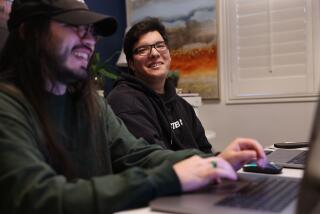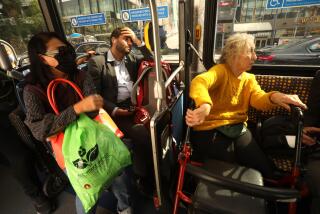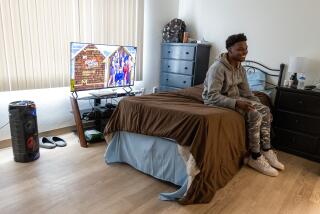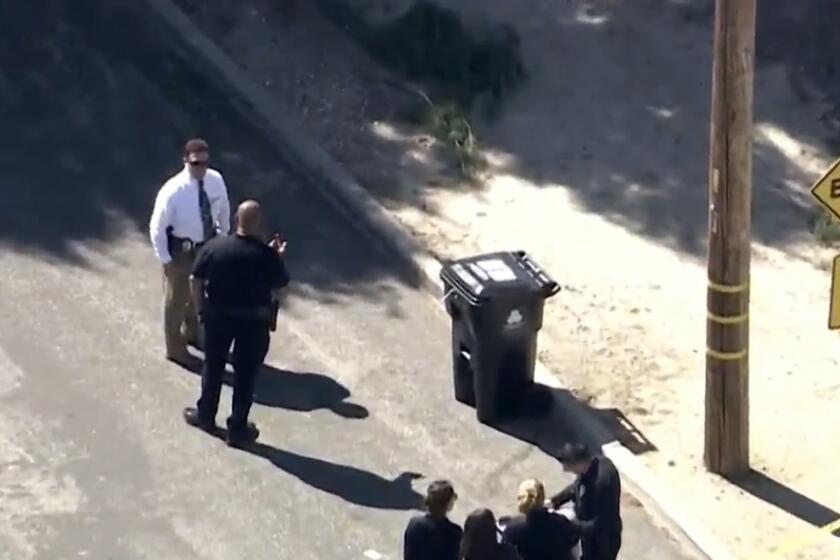She’s not a martyr or a saint -- just a mom

<p>Dayna Bennett discusses her bond with adopted daughter Shellie. Bennett met Shellie when she was 14 and a student in her special-needs class. Shellie is now 22.</p>
Shellie Joy was 14 when she met the woman who would become her mother. Abandoned by her family, she’d grown up in a group home, belted into a wheelchair and tethered to machines.
She’d been born missing part of her brain. Her eyes were blank, and her limbs were little more than stumps and claws. Deemed too “retarded” to manage solid food, she was fed through a tube while she slept.
Still, every school day, Shellie was loaded into a van and wheeled into Dayna Bennett’s class at the Lowman Special Education Center in North Hollywood.
For more than 10 years, Bennett had been teaching children with severe disabilities: teenagers still in diapers, children with brain injuries, fragile kids hooked to ventilators or strapped to gurneys.
The teacher knew what Shellie’s records implied: She couldn’t see or hear or think.
But Bennett didn’t believe it. “Every once in a while, I’d say something and I could tell. She knows what’s going on.”
The only word Shellie could say was “mama.” She’d blurt it out whenever a woman neared, her voice strained with hope so naive, it rubbed Bennett’s seasoned heart raw.
Most of her other students had family or friends, but Shellie was alone.
“There was no one in her life who wasn’t being paid to take care of her,” Bennett said.
The teacher began visiting Shellie at the group home, just to sit beside her bed. She prayed that someone patient and kind would find this child fit to love.
It would take months for Bennett’s will to catch up with her heart — and years for the foster care system to make it official.
Shellie moved in with her teacher at 17. And two years ago, when Shellie was 20, Dayna Bennett became her mama.
::
I met Bennett eight years ago, after she adopted a 17-year-old who’d spent his life in foster homes, detention centers and psychiatric wards. She’d already adopted his younger sister and another girl from foster care and had taken in a teenage girl who was having trouble at home.
She was a 29-year-old single woman raising four traumatized teens — 18, 16, 15 and 14. I wrote about her then, and I marvel at her still.
Her three older children are on their own now. Her son moved to Visalia. Her daughters are married and live nearby; one has a 6-month-old son.
Bennett knows that Shellie will never leave home. She’s medically fragile and has the cognitive skills of a 2-year-old. She drools, wears diapers and can’t sit up alone.
But Shellie’s eyes light up at her mother’s voice. She squeals with delight at her favorite songs and protests when Bennett tries to dress her in anything that isn’t pink or doesn’t sparkle. One of the few words she says clearly is “mall.”
She’s nothing like the passive child who used to sit in class listless and numb.
Their small Lancaster home has tile floors and wide aisles so Shellie can get around; there are plenty of books, games and noise-making toys. The family room is crowded with an expensive arsenal of medical contraptions that Bennett bought to strengthen Shellie’s limbs and exercise her mind.
Money is tight, but Mom is creative. She fashioned a pillow that Shellie wears like a necklace to keep her head from flopping onto her chest. She decorated leg splints to encourage her daughter to try to stand. She takes her out almost every day, pushing her bulky wheelchair on walks around the neighborhood: to lunch at Chuck E. Cheese, shopping at Walmart or matinees at the discount theater, where admission for two costs $3.
Shellie even has a social life.
She’s been a regular at the Wednesday night youth group at church. And she celebrated her 18th birthday with a slumber party with two similarly disabled friends. “I let my other girls have slumber parties,” Bennett said. “How could I deprive Shellie of that?”
She doesn’t know how much her daughter remembers, but Bennett won’t forget how good it felt to watch the teenagers lolling on a futon on the living room floor, babbling and giggling.
::
Bennett is neither a martyr nor a saint — just a woman who believes that every child deserves to be encouraged and loved.
She’s let go of her dream of marriage and babies. “But I do love being a mom,” she said. It’s a calling, not merely a choice.
Mothering can feel like a thankless job in the best of circumstances. But Bennett considers Shellie a gift: “She is the most chronically happy child I have ever met in my whole life. … Whether it’s two years or 20 years, every day I get with her, I’m just going to enjoy it.”
Still, caring for an adult with the mind of a toddler can be an ordeal.
Shellie has trouble swallowing, so it can take 45 minutes to finish a meal of soft food and sandwiches cut into tiny bites. Getting her bathed and into bed each night is an exhausting process — at 120 pounds, she’s hard to lift. And a string of medical setbacks has left Shellie hooked to an oxygen tank that makes her wheelchair so heavy, Bennett can no longer maneuver it into her ancient minivan. She needs a van with a wheelchair lift to get them mobile again.
That is putting a damper on Mothers Day. They’d planned to spend it at a family gathering with Bennett’s parents — Me-ma and Be-pa to Shellie — but they’ll be at home instead. Bennett is not complaining; she is trying to solve the problem.
She’s launched a GoFundMe page, sharing Shellie’s story and seeking advice and donations. That’s hard for a woman who prides herself on being self-sufficient and taking good care of her children.
“I’m determined that Shellie will never be home-bound or bedridden again,” Bennett said. “She’s counting on me. I’m her mama.” As if on cue, Shellie lifted her head, looked at her mother and squealed. And Mama turned and wiped the drool from her chin.
Bennett’s fundraising page is gofundme.com/ShellieJoy.
Twitter: SandyBanksLAT
More to Read
Start your day right
Sign up for Essential California for news, features and recommendations from the L.A. Times and beyond in your inbox six days a week.
You may occasionally receive promotional content from the Los Angeles Times.







